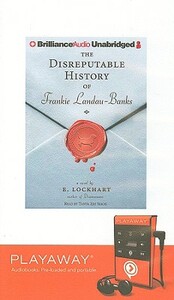Take a photo of a barcode or cover
This was the feminist YA book I have been looking for. I can't begin to say how glad I am it exists.
I don't really know how to review this. Because I liked it. But it also took foreeeeeeeeeeeeeeeeeeeeeeeeeeeeever for anything to happen. But there were a ton of moments that I highlighted because they were glorious. But a ton of the characters drove me up the wall. But it was fun. But it was SO SLOW.
So yeah. I LOVED Frankie sticking it to the patriarchy. But holy mackerel, the evil-genius-plans that we're told about in the first few pages of the book? Yeah, those don't start happening until like half way through the book. That's a LOT of build up. And then a lot of action crammed into a really short space of time. All the male characters - and, to be honest, a lot of the female characters - drove me up the wall and I kind of wanted to slap some sense into them.
I wanted to love it, I really did. But there was so much of it that was slow or infuriating that it just came out at liking it. Sigh.
So yeah. I LOVED Frankie sticking it to the patriarchy. But holy mackerel, the evil-genius-plans that we're told about in the first few pages of the book? Yeah, those don't start happening until like half way through the book. That's a LOT of build up. And then a lot of action crammed into a really short space of time. All the male characters - and, to be honest, a lot of the female characters - drove me up the wall and I kind of wanted to slap some sense into them.
I wanted to love it, I really did. But there was so much of it that was slow or infuriating that it just came out at liking it. Sigh.
3.5 stars rounded up. This book has been on my TBR list for YEARS. I had no expectations going in, but thought it was enjoyable. The author used some words repeatedly that I don’t see kids using frequently these days (grodie, for example) but other than that it was pretty entertaining.
funny
informative
inspiring
lighthearted
fast-paced
Plot or Character Driven:
Character
Strong character development:
Yes
Loveable characters:
Yes
Diverse cast of characters:
No
Flaws of characters a main focus:
Yes
I thoroughly enjoyed this book and it went in directions I was not expecting. I story of a young woman finding her place in the world. Strong feminist bent.
There's a trend in YA fiction toward unremarkable main characters, girls who are aggressively average, so that readers can identify with them. I hate to continue harping on Bella Swan, because (1) she's just a symptom, not the whole problem, and (2) it is depressing to see one character whose author failed her so miserably get so much hate piled upon her. But she's the most visible example, so. Everything about Bella is designed to let the reader (or, well, let's be honest - the author) step into her shoes and imagine herself with dreamy stalker Edward Cullen. She doesn't really have any hobbies, she's neither great nor terrible in school, and her thoughts are almost all directed outward - her boyfriend, her (theoretically) charmingly incompetent parents - we know very little about her because she's got no personality and no highs or lows.
Well, that's simultaneously boring and insulting. Where did we get this idea that readers (specifically girls) can only relate to dull, simplistic characters? What does that say about the way the publishing industry views young girls? It's gross and it's maddening and it's completely unnecessary; a talented author makes a character relatable because her actions are understandable and sympathetic, not because she's so lacking in personality or accomplishments that a reader is forced to graft on her own.
E. Lockhart is a talented author, and Frankie Laundau-Banks is exceptional. She's clever and brave and pretty, but she can also be mean and angry and short-sighted. She's a 10th grader who reads Wodehouse for fun, she's her parents' silly Bunny Rabbit, and she's grown up enough to be sick of being boxed in, but maybe not enough to know exactly how to fix it. This book could have easily become preachy - early on, Frankie begins dating the boy she's had a crush on for the last year, and discovers that it's not all it's cracked up to be. He's not a bad person, but he doesn't understand what he has in her, doesn't get what we know, that she is whip-smart and not content to just be a girlfriend on the fringe of his boys club. So, yeah, it could have easily become hackneyed, a dumbed-down clumsily-told tale of burgeoning feminism, or something. But it never did - the feminism is there, organically. And it's realistic; things don't always work out and people often don't appreciate it when you call out sexism or work your way into places where you aren't traditionally welcomed. And Frankie's pissed off by the exclusion she encounters - this is a side of feminism that stories tend to overlook (probably intentionally, because everyone is so afraid of the Angry Feminist stereotype that they completely erase anyone's completely correct and justified outrage at the way women are viewed and treated), but Lockhart's not interested in whitewashing this. People discount Frankie and underestimate her and treat her like she has no mind of her own, and it's horrible and it makes her angry and she acts out of anger as much as (maybe more than) an intangible, vague idea of what's Right. And that's okay.
Frankie's not a capital-H Hero. She can be kind of petty, and she makes some questionable choices, and she's a person, not a morality tale. In what might be my favorite sequence in the book, she holds her own against an older girl in an impromptu argument over the dangers of prescriptive gender roles, noting that her boyfriend and his friends are uncomfortable, and refusing to shut up. It's a good moment. And then in the next scene, she's agonizing - does he still like me, is he over me now that he's seen me be argumentative, does he think I'm shrill? These are real things people worry about. This is the way lots of women react. There is bravery followed by worry, and it sucks, and in a lot of books, that second part wouldn't have been written because two-dimensional "strong female characters" (and let me say, if you have to spell out someone's strength instead of it being obvious through her characterization, she's probably not the feminist icon you think she is) don't worry about that kind of stuff, nope. But there is an honesty to this book that was surprisingly mature, and kind of sad.
While I was reading, there were three (THREE!) occasions when I was utterly convinced I knew how this was going to end. And all three times I was proved wrong, and I've never been more happy to make completely incorrect predictions.
My one complaint is that there are one or two instances of what felt like pitting Frankie against other girls who aren't quite as enlightened as she is (specifically Star, but sometimes Elizabeth), which is counterproductive - there's no one correct way to be a girl, and if someone's behavior is in line with the way everyone else views and treats her, it's not entirely her fault. It wasn't outrageous, and in most books I probably wouldn't have batted an eyelash at it, but this book got everything else so right that I was a little taken aback by the hints of the Right Kind vs Wrong Kind of girl attitude.
I had a weird aversion to this book, and I just realized it is because the cover art reminds me of [b:The Guernsey Literary and Potato Peel Pie Society|4666058|The Guernsey Literary and Potato Peel Pie Society|Mary Ann Shaffer|http://photo.goodreads.com/books/1266870580s/4666058.jpg|2754161] (they actually aren't that similar, but they are weirdly bound in my mind), to which I developed an irrational aversion while I worked at Barnes and Noble and had to reshelve it constantly, and Frankie Landau-Banks reminded me of Frankie Muniz/Agent Cody Banks (and I shouldn't have to explain why that's a bad thing). And the back cover copy is sort of wretched and makes it look like just the kind of Plucky Heroine Topples Opposition and Changes Everyone's Hearts and Minds book that it wasn't. So. It had a lot of things working against it in my case, but I'm glad someone whose taste I admire recommended it and I finally read it.
Well, that's simultaneously boring and insulting. Where did we get this idea that readers (specifically girls) can only relate to dull, simplistic characters? What does that say about the way the publishing industry views young girls? It's gross and it's maddening and it's completely unnecessary; a talented author makes a character relatable because her actions are understandable and sympathetic, not because she's so lacking in personality or accomplishments that a reader is forced to graft on her own.
E. Lockhart is a talented author, and Frankie Laundau-Banks is exceptional. She's clever and brave and pretty, but she can also be mean and angry and short-sighted. She's a 10th grader who reads Wodehouse for fun, she's her parents' silly Bunny Rabbit, and she's grown up enough to be sick of being boxed in, but maybe not enough to know exactly how to fix it. This book could have easily become preachy - early on, Frankie begins dating the boy she's had a crush on for the last year, and discovers that it's not all it's cracked up to be. He's not a bad person, but he doesn't understand what he has in her, doesn't get what we know, that she is whip-smart and not content to just be a girlfriend on the fringe of his boys club. So, yeah, it could have easily become hackneyed, a dumbed-down clumsily-told tale of burgeoning feminism, or something. But it never did - the feminism is there, organically. And it's realistic; things don't always work out and people often don't appreciate it when you call out sexism or work your way into places where you aren't traditionally welcomed. And Frankie's pissed off by the exclusion she encounters - this is a side of feminism that stories tend to overlook (probably intentionally, because everyone is so afraid of the Angry Feminist stereotype that they completely erase anyone's completely correct and justified outrage at the way women are viewed and treated), but Lockhart's not interested in whitewashing this. People discount Frankie and underestimate her and treat her like she has no mind of her own, and it's horrible and it makes her angry and she acts out of anger as much as (maybe more than) an intangible, vague idea of what's Right. And that's okay.
Frankie's not a capital-H Hero. She can be kind of petty, and she makes some questionable choices, and she's a person, not a morality tale. In what might be my favorite sequence in the book, she holds her own against an older girl in an impromptu argument over the dangers of prescriptive gender roles, noting that her boyfriend and his friends are uncomfortable, and refusing to shut up. It's a good moment. And then in the next scene, she's agonizing - does he still like me, is he over me now that he's seen me be argumentative, does he think I'm shrill? These are real things people worry about. This is the way lots of women react. There is bravery followed by worry, and it sucks, and in a lot of books, that second part wouldn't have been written because two-dimensional "strong female characters" (and let me say, if you have to spell out someone's strength instead of it being obvious through her characterization, she's probably not the feminist icon you think she is) don't worry about that kind of stuff, nope. But there is an honesty to this book that was surprisingly mature, and kind of sad.
While I was reading, there were three (THREE!) occasions when I was utterly convinced I knew how this was going to end. And all three times I was proved wrong, and I've never been more happy to make completely incorrect predictions.
My one complaint is that there are one or two instances of what felt like pitting Frankie against other girls who aren't quite as enlightened as she is (specifically Star, but sometimes Elizabeth), which is counterproductive - there's no one correct way to be a girl, and if someone's behavior is in line with the way everyone else views and treats her, it's not entirely her fault. It wasn't outrageous, and in most books I probably wouldn't have batted an eyelash at it, but this book got everything else so right that I was a little taken aback by the hints of the Right Kind vs Wrong Kind of girl attitude.
I had a weird aversion to this book, and I just realized it is because the cover art reminds me of [b:The Guernsey Literary and Potato Peel Pie Society|4666058|The Guernsey Literary and Potato Peel Pie Society|Mary Ann Shaffer|http://photo.goodreads.com/books/1266870580s/4666058.jpg|2754161] (they actually aren't that similar, but they are weirdly bound in my mind), to which I developed an irrational aversion while I worked at Barnes and Noble and had to reshelve it constantly, and Frankie Landau-Banks reminded me of Frankie Muniz/Agent Cody Banks (and I shouldn't have to explain why that's a bad thing). And the back cover copy is sort of wretched and makes it look like just the kind of Plucky Heroine Topples Opposition and Changes Everyone's Hearts and Minds book that it wasn't. So. It had a lot of things working against it in my case, but I'm glad someone whose taste I admire recommended it and I finally read it.
This had been on my list for years. YEARS. I finally got to it when a friend mentioned he hadn't read it yet either, so we should give it a go and buddy-read it.
I want to like this book. But overall I feel meh. None of the characters are worth liking. Frankie is annoying (we'll get to this in a second.) Matthew is clearly shady. Alpha seems to be the one we should want her to be with, but he's a dick. The story moves too slowly and by the time pranks started happening, I just didn't care.
From the beginning the book had a total Wes Anderson vibe, and my head-voice was Alec Baldwin, a la "The Royal Tenenbaums". That was a plus for me.
Frankie. Oh Frankie. You can't go around whining about how Matthew only wants a "pretty package" and then enjoy the fact that everyone likes you because you're pretty now.
All that being said, the prose itself was good and I highlighted a bunch of passages that, if you forget the story and characters, are really great.
"Frankie remembered how Matthew had called her a 'pretty package,' how he'd called her mind little, how he'd told her not to change - as if he had some power over her. A tiny part of her wanted to go over to him and shout, 'I can feel like a hag some days if I want! And I can tell everyone how insecure I am if I want! Or I can be pretty and pretend to think I'm a hag out of fake modesty - I can do that if I want, too. Because you, Livingstone, are not the boss of me and what kind of girl I become.'"
"Matthew had called her harmless. Harmless. And being with him made Frankie feel squashed into a box - a box where she was expected to be sweet and sensitive (but not oversensitive); a box for young and pretty girls who were not as bright or powerful as their boyfriends. A box for people who were not forces to be reckoned with."
I want to like this book. But overall I feel meh. None of the characters are worth liking. Frankie is annoying (we'll get to this in a second.) Matthew is clearly shady. Alpha seems to be the one we should want her to be with, but he's a dick. The story moves too slowly and by the time pranks started happening, I just didn't care.
From the beginning the book had a total Wes Anderson vibe, and my head-voice was Alec Baldwin, a la "The Royal Tenenbaums". That was a plus for me.
Frankie. Oh Frankie. You can't go around whining about how Matthew only wants a "pretty package" and then enjoy the fact that everyone likes you because you're pretty now.
All that being said, the prose itself was good and I highlighted a bunch of passages that, if you forget the story and characters, are really great.
"Frankie remembered how Matthew had called her a 'pretty package,' how he'd called her mind little, how he'd told her not to change - as if he had some power over her. A tiny part of her wanted to go over to him and shout, 'I can feel like a hag some days if I want! And I can tell everyone how insecure I am if I want! Or I can be pretty and pretend to think I'm a hag out of fake modesty - I can do that if I want, too. Because you, Livingstone, are not the boss of me and what kind of girl I become.'"
"Matthew had called her harmless. Harmless. And being with him made Frankie feel squashed into a box - a box where she was expected to be sweet and sensitive (but not oversensitive); a box for young and pretty girls who were not as bright or powerful as their boyfriends. A box for people who were not forces to be reckoned with."
This book was quite underwhelming. I was promised hijinks and hilarity, but the only things delivered were a few okay juvenile pranks and a relationship that I kept hoping would end.





